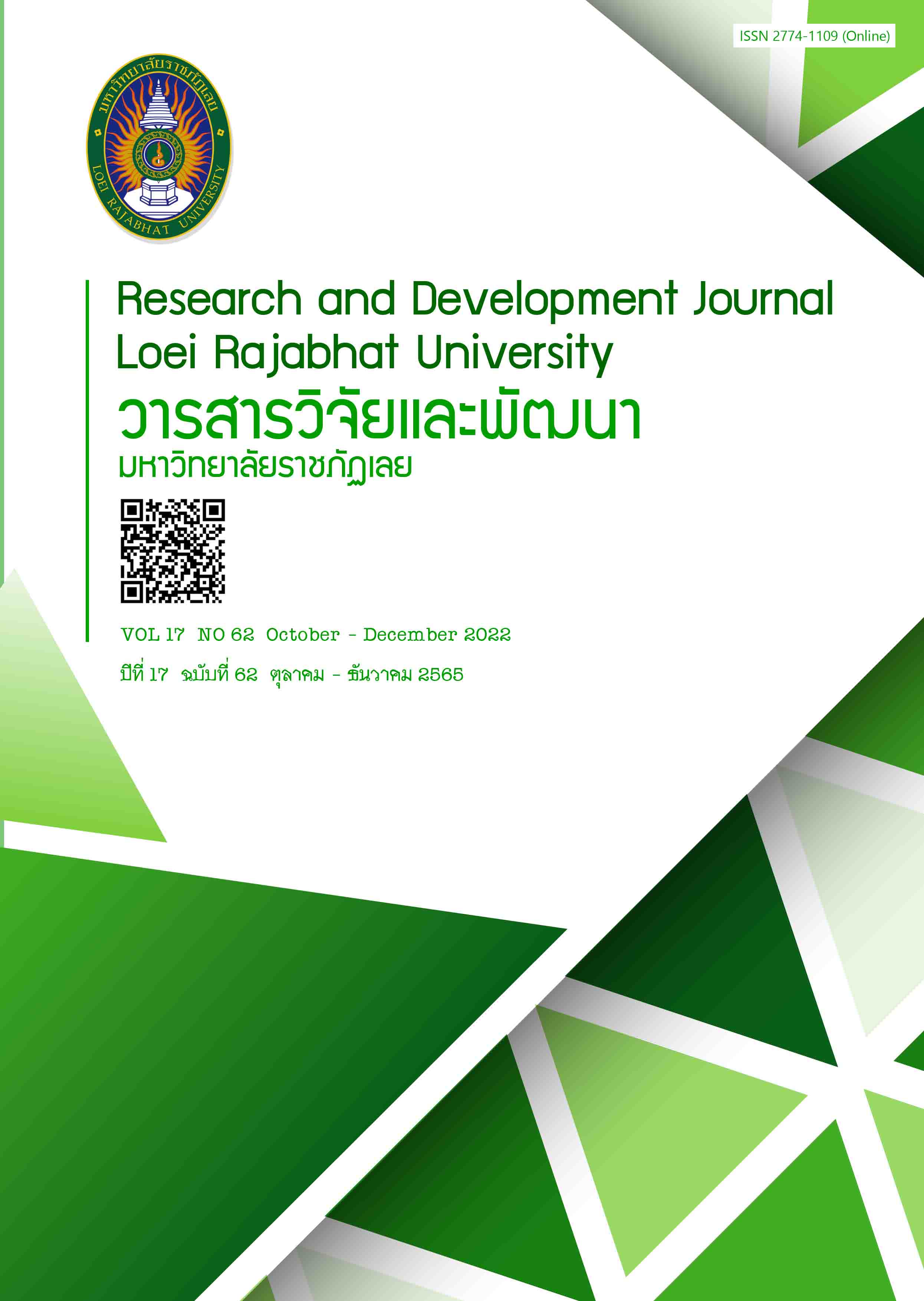Human Resource Development Requirement for Government Officers of the National Bureau of Agricultural Commodity and Food Standards in the Digital Age
Keywords:
requirement on human resource development, digital age, operational factorsAbstract
The objectives of this study were: 1) to study the human resource development requirements of government officers of the National Bureau of Agricultural Commodity and Food Standards in the digital age; 2) to compare the human resource development requirements of government officers of the National Bureau of Agricultural Commodity and Food Standards classified by personal factors; and 3) to study operational factors related to the human resource development requirements of government officers of the National Bureau of Agricultural Commodity and Food Standards in the digital age. The sample group used in this research consisted of 121 government officers from the National Bureau of Agricultural Commodity and Food Standards by stratified random sampling. A questionnaire was used as the tool to collect data. Statistics used in this research were percentage, mean, frequency, Standard Deviation, t-test, One-Way ANOVA and Pearson’s correlation coefficient (r). Statistical significance was determined at .05.
The results revealed that, in overview, most government officers of the National Bureau of Agricultural Commodity and Food Standards had requirement on human resource development in the digital age at a high level. When considering each dimension, it was found that the dimension on training had the highest mean, followed by the dimension on study trip, and the dimension with the lowest mean was education. The results of hypothesis testing revealed that government officers with different personal factors, including ages, genders, education levels, positions, years of service, and average monthly income, had no difference regarding human resource development requirements in the digital age. In addition, it was also found that operational factors, including Thailand's 4.0 Policy on career path, improvement of operational efficiency, advancement of digital technology, and administrative support, had a relation to the human resource development requirements of government officers of the National Bureau of Agricultural Commodity and Food Standards in the digital age with statistical significance at .05.
References
ประคอง ยิ่งจอหอ, สุรศักดิ์ อมรรัตนศักดิ์ และ สมจิตรา เรืองศรี. (2563). ความต้องการในการพัฒนาตนเองตามทักษะแห่งศตวรรษที่ 21 ของครูคณิตศาสตร์ สังกัดสำนักงานเขตพื้นที่การศึกษามัธยมศึกษา เขต 2. วารสารนาคบุตรปริทรรศน์ มหาวิทยาลัยราชภัฏนครศรีธรรมราช, 12(1), 142-150.
สมพร ชีวะพันธ์. (2561). ความต้องการพัฒนาตนเองของครูตำรวจโครงการการศึกษาเพื่อต่อต้านการใช้ยาเสพติดในนักเรียน (ครูตำรวจ D.A.R.E) ในจังหวัดสงขลา. วารสารสังคมศาสตร์และวัฒนธรรม, 2(2), 1-7.
สำนักงานคณะกรรมการข้าราชการพลเรือน. (2564). แนวทางการทักษะด้านดิจิทัลของข้าราชการและบุคลากรภาครัฐ. สืบค้นจาก www.ocsc.go.th.
สำนักงานมาตรฐานสินค้าเกษตรและอาหารแห่งชาติ. (2564). แผนกลยุทธ์การยกระดับการพัฒนาทรัพยากรบุคคล พ.ศ. 2564 – 2566. กรุงเทพฯ: สำนักงานมาตรฐานสินค้าเกษตรและอาหารแห่งชาติ.
สุธีรา อัมพาผล และ ปฏิพัทธ์ จันทร์รุ่งเรือง. (2561). ความต้องการพัฒนาตนเองของบุคลากรสำนักงานปลัดกระทรวงทรัพยากรธรรมชาติและสิ่งแวดล้อม. วารสารวิทยาลัยเซาธ์อีสท์บางกอก, 4(1), 51-66.
สุนิษา กลึงพงษ์. (2556). ความต้องการพัฒนาตนเองของบุคลากรสายปฏิบัติการ คณะพาณิชศาสตร์และการบัญชี จุฬาลงกรณ์มหาวิทยาลัย (ปริญญานิพนธ์การศึกษามหาบัณฑิต). มหาวิทยาลัยศรีนครินทรวิโรฒ, กรุงเทพฯ.
แสงเดือน เรือนคำ และ พิชิต รัชตพิบุลภพ. (2564). ความต้องการพัฒนาทรัพยากรบุคคลของพนักงานองค์กรปกครองส่วนท้องถิ่นในเขตอำเภอเมืองนนทบุรี จังหวัดนนทบุรี. Journal of Administrative and Management Innovation, 9(3), 27-35.
อุมาพร แม้นเหมือน และ พิพัฒน์ ไทยอารี. (2564). ความต้องการพัฒนาศักยภาพในการทำงานของบุคลากรในด้านเทคโนโลยีสารสนเทศและการสื่อสารของหน่วยงานภาครัฐ ในช่วงสถานการณ์การแพร่ระบาดของโรคติดเชื้อไวรัสโคโรนา 2019 (สารนิพนธ์ปริญญามหาบัณฑิต). มหาวิทยาลัยธุรกิจบัณฑิตย์, กรุงเทพฯ.
Herzberg, F., Mausner, B. and Snyderman, B. (1959). The Motivation to work. New York: John Wiley & Sons.
Krejcie, R. V. and Morgan, D. W. (1970). Determining Sample Size for Research Activities. Educational and Psychological Measurement, 30(3), 607-610.
McClelland, D.C. (1987). Human Motivation. New York: Cambridge University Press.
Nadler, Leonard, and Wiggs, Garland D. (1989). Managing Human Resource Development. San Francisco: Jossey-Bass.
Downloads
Published
How to Cite
Issue
Section
License
Copyright (c) 2022 Research and Development Journal, Loei Rajabhat University

This work is licensed under a Creative Commons Attribution-NonCommercial-NoDerivatives 4.0 International License.
ข้อความที่ปรากฎในวารสารฉบับนี้เป็นความคิดเห็นของผู้เขียนแต่ละท่าน สถาบันวิจัยและพัฒนา มหาวิทยาลัยราชภัฏเลย และกองบรรณาธิการ ไม่จำเป็นต้องเห็นด้วยและไม่มีส่วนรับผิดชอบใดๆ
สถาบันวิจัยและพัฒนา มหาวิทยาลัยราชภัฏเลย ขอให้ผู้อ่านอ้างอิงในกรณีที่ท่านคัดลอกเนื้อหาบทความในวารสารฉบับนี้






